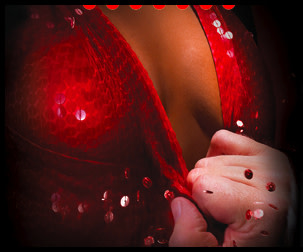Review: Race

ENDS APRIL 8 David Mamet doesn’t so much talk about Race, as he talks about talking about it. And though his black and white characters brashly air the dirty laundry of not only themselves but their forefathers during Artists Reparatory Theater ‘s production, it becomes pretty clear that they’re not even trying to wash it.
“Race,” explains Mamet in his libretto, “is a subject about which it’s almost impossible to tell the truth,” and it seems that his solution to this problem is making his characters as frank—nay, bombastic—as possible. As two black attorneys (one female and one male) and two white males (a defense attorney and an accused rapist) pore over forensic and legal facts, each mounts a case for his kind, with gob-smacking assertions that claim to speak for all. Jack (Todd Van Voris) declares that white people can’t help but take advantage of black people at every opportunity; it’s just in their nature. Henry (Reginald André Jackson) says that there is nothing that a white person can say to a black person about race.
The storyline is rife with contention: A rich white executive is accused of raping a black woman who may or may not be a prostitute, and he approaches a mixed-race law firm to defend him, partially because he believes their demographic diversity will help bolster his case. These assumptions, and subsequent ones, trigger an onslaught of “us-versus-you” rhetoric that, while undeniably bold, simply cannot be universally true. And as an audience member, one can’t help but wonder: If gross generalizations led us into this race-relations mess, how can they possibly help usher us out? After all, moderates and peacemakers—just like radicals and instigators—come in every color.
“The only way out, is through,” says attorney Jack to accused rapist Charles, and Mamet reiterates this premise in his libretto. But as the plot thickens, the four characters’ allegiances only scatter further asunder, across additional divisive platforms of sexism, tokenism, and socioeconomic privilege.
If Mamet’s tacit intention is to prove the inefficacy of demonizing the opposition, then he’d probably find a kindred spirit in comedian Dave Chappelle (whose impromptu 2010 appearance in Pioneer Courthouse Square drew a crowd of thousands, proving a popularity some, and he himself, found surprising in a notoriously whitewashed city). In a succinct three minutes, Chappelle’s provocative When Keeping It Real Goes Wrong sketches demonstrate the pitfalls of angrily mouthing off in defense of your principles, even when you’re in the right. (WARNING: ADULT LANGUAGE)
Mamet takes two hours to make the same point—or perhaps to try to prove the opposite? We’re unsure. There is a hint, both in Mamet’s libretto and in Artists Rep’s performance that beyond the fevered peak of disagreement, society’s bound to coast toward a meaningful resolution. However, neither this reviewer’s experience nor the theatrical narrative in Race plays this theory through. With the exception of the accused rapist, who has a brief blink of true regret once it’s too late, the curtain closes on characters more divided and bitter than ever.
Mr. Mamet may decry diplomacy as the coward’s course; still, one comes away with a hunch that a little more tact and benefit-of-doubt wouldn’t hurt. Even the most damning facts of the case are brought to light through critical thinking, not scathing invectives. So while berating the opposing party may feel empowering in the moment, ultimately the play’s chosen battlefield—criminal law—offers better rules of engagement: presume every person is innocent until proven guilty.
For more about Portland arts, visit PoMo’s Arts & Entertainment Calendar, stream content with an RSS feed, or sign up for our weekly On The Town Newsletter!
